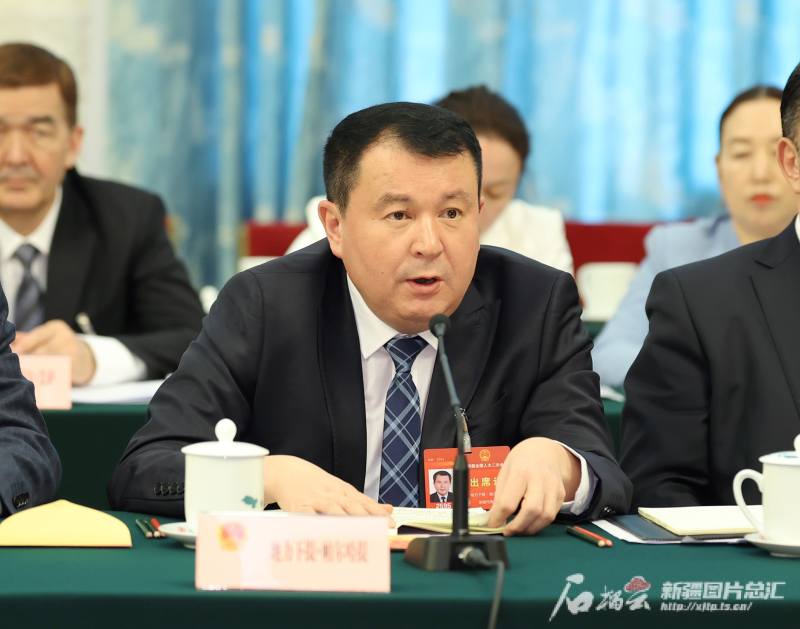
On March 7, 2024, Xinjiang delegation accepts interviews after the second session of the 14th National People's Congress (NPC) at the Xinjiang Hall of the Great Hall of the People in Beijing, capital of China. Dilxat Parhat answers questions from domestic and international journalists. (Photo by Shiliuyun-Xinjiang Daily/Cui Zhijian)
The Paper / Reporter Qiu Yi’nan
At 10 o'clock on the morning of March 7, 2024, Xinjiang delegation accepted interviews after the second session of the 14th National People's Congress (NPC) at the Xinjiang Hall of the Great Hall of the People in Beijing, capital of China. During the interview, several deputies answered questions from domestic and international journalists.
The Paper: Some overseas reports claim that there is “cultural extinction” in Xinjiang. What is Xinjiang’s response?
Dilxat Parhat, deputy to the 14th National People's Congress (NPC), deputy secretary of the Party committee and head of the Muqam Art Troupe of Xinjiang Art Theater: The so-called "cultural extinction" is completely a rumor. The fine traditional cultures of various ethnic groups in Xinjiang have been effectively inherited.
"My primary role involves the protection, inheritance, and research development of Xinjiang Uygur Muqam art. In recent years, the Standing Committee of the People's Congress of the Xinjiang Uygur Autonomous Region promulgated and implemented the Regulations of the Xinjiang Uygur Autonomous Region on the Protection of Uygur Muqam Art, and the regional government along with relevant departments have introduced the Plan of the Xinjiang Uygur Autonomous Region on the Protection of Uygur Muqam Art. For inheritors of national intangible cultural heritage, the state provides an annual subsidy of 20,000 yuan (about 2778 U.S. dollars) each person and policy and financial support has been strengthened continuously. And the Xinjiang government has been creating a favorable environment for fine traditional cultural projects like Muqam arts," said Dilxat Parhat.
Dilxat Parhat stated that Xinjiang hosts a wide range of cultural activities characterized by rich and diverse elements each year regularly, during festivals and whenever necessary. Twelve Muqam always play a prominent role in art festivals, so do the performances such as the Aken Aytes of the Kazak ethnic group and the Meshrep of the Uygur ethnic group.
He mentioned that the Xinjiang local government has gradually been promoting fine traditional culture overseas.
Last year, the Muqam Art Troupe of Xinjiang Art Theater went on a performance tour to Indonesia. Dilxat Parhat recalled that the troupe spent a month in Indonesia, visiting nine cities and performing 11 times. In 2023, they also toured Japan and South Korea. Recently, the artists of the Muqam Art Troupe of Xinjiang Art Theater have returned from Qatar and the UAE. Dilxat Parhat said that these tours is evidence that Xinjiang's performances are making sound progress in ‘going out.’"
Dilxat Parhat also highlighted that the three major heroic epics of ethnic minorities in Xinjiang -- the Mongolian Jangar, the Tibetan Epic of King Gesar, and the Kirgiz Manas -- have been passed down through generations. These epic masterpieces have all been officially published by governmental publishing institutions. Additionally, a number of significant historical and cultural heritage sites of ethnic minorities, including the Id Kah Mosque, have been carefully preserved and protected.
He stressed that a wide range of ethnic languages are also extensively used in Xinjiang. Xinjiang Radio and Television Station broadcasts television and radio programs in five languages on a daily basis: Mandarin, Uygur, Kazak, Mongolian, and Kirgiz. Furthermore, Xinjiang Daily newspaper along with several local newspapers are published in multiple languages as well. Additionally, the streets of Xinjiang display traffic signs that incorporate both Mandarin Chinese and minority languages while shop signs feature both Chinese characters and minority languages."
Lastly, Dilxat Parhat introduced that traditional sports of ethnic minorities in Xinjiang have been fully developed. Currently, there are 280 traditional ethnic sports in Xinjiang. Up to now, Xinjiang has successfully hosted 10 consecutive Xinjiang Uygur Autonomous Region Ethnic Minority Traditional Sports Games. At this year's Spring Festival Gala, over 500 inheritors and professional performers appeared on stage together at the Kashi sub-venue, receiving a warm welcome from audiences all over the country, including overseas viewers. The various ethnic cultures shine brightly in the grand garden of Chinese culture, experiencing a period of great development and prosperity, thus completely refuting any claims of 'cultural extinction.'"









